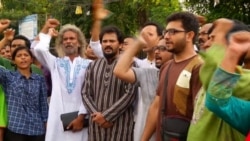A gang of about six men, armed with machetes and cleavers, hacked a blogger to death in Bangladesh on Friday, marking the fourth such murder of a secular writer in the South Asian nation since the beginning of this year.
Forty-year-old Niloy Chakrabarti, who was known for his atheist views, was killed at his home around noon in the Dhaka neighborhood of Goran.
“The men entered Niloy’s house, pushed aside his wife and a friend, and hacked him to death. Earlier this year they killed the three secular bloggers on the street. Now they have killed another blogger entering his house in a daring attack,” said Imran H. Sarker, who leads the Blogger and Online Activist Network in Bangladesh, in an interview.
Police in Dhaka told reporters the assailants almost severed the victim's neck with sharp weapons to ensure he was dead.
Hours later, media outlets received a claim of responsibility for the murder from a group claiming to be the Bangladesh wing of al-Qaida in the Indian Subcontinent.
Mustafizur Rahman Bhuiyan, the officer–in-charge of Dhaka’s Khilgaon police station, said the assailants tricked their way into Chakrabarti’s house.
“One man knocked on the door of Chakrabarti and said that he was looking for a flat on rent. After Chakrabarti apparently agreed to help him and welcomed him in his fifth-floor apartment, other men who carried sharp weapons forced into the house,” Bhuiyan told VOA by telephone.
“Two of them took Chakrabarti into a room and hacked him to death.”
Bhuiyan said the assailants appeared to have timed the attack to take place when most of the victim's male neighbors were away for Friday prayers.
Chakrabarti wrote for a Bengali language blog called “Istishan,” meaning "station" or "railway station" in Bengali. He used the pen name of Niloy Neel and was critical of fundamentalism in all religions.
The blogger, who worked with a non-government organization, was also an activist with Dhaka’s Gonojagoron Mancho or National Awakening Platform — a group that supports Bangladesh’s war crime tribunal and seeks the execution of all who were involved in war crimes during the 1971 war.
Chakrabarti complained to the police in May that suspicious people were trailing him at public places and said he feared for his life. He claimed in a subsequent Facebook posting that police did not take his complaint seriously.
In a move to protect his identity, the Dhaka-based blogger removed all his pictures from his Facebook page and claimed as his home a fictitious address in Kolkata.
Sarker, who is also a leader of Gonojagoron Mancho, claimed that Islamists had placed Chakrabarti on a "hit list."
“They killed three other bloggers earlier this year. Now they have killed Chakrabarti. We don’t know when this procession of killing of the freethinking bloggers will end,” said Sarker who took part Friday in a Dhaka protest rally accusing the government of failing to protect the bloggers.
Shammee Haque, an activist with Mancho, said the government’s failure to investigate the previous killings was leading to the murder of more bloggers.
“Police have miserably failed to investigate the murders of the other bloggers in the past. This is why we have seen Niloy Chakrabarti murdered today. I am sure that Niloy’s killers too will remain untraced,” Haque said in an interview.
In February, Bangladeshi-American blogger and writer Avijit Roy, who founded the popular atheist blog “Mukto-Mona” (Free Mind in Bengali), and was known for his opposition to religious fundamentalism, was hacked to death in Dhaka.
In March, Washiqur Rahman, another blogger known for his views critical of Islam, was killed in a machete attack by three Islamists in the same city.
Police arrested one suspect in Roy’s killing, while two of Rahman’s assailants — both students at a religious school — were caught at the scene of the crime.
In May, blogger Ananta Bijoy Das, 33, was killed by a machete-wielding masked gang in the northeastern city of Sylhet while he was on his way to his job at a bank. Police arrested a local photo-journalist as a suspect in June.
The U.S.-based Center for Inquiry (CFI), an organization known for criticizing religions and promoting humanism, criticized the Bangladesh government for the death of yet another blogger.
"What was already a human rights crisis has now spun entirely out of control, and it is now long overdue for the government of Bangladesh to take seriously its moral responsibility to protect the lives of its people," said Ronald A. Lindsay, president and CEO of CFI, in a formal statement.
"But this problem goes deeper than just Bangladesh. The world can no longer sit by and allow this global crackdown on free expression, by both terror groups and states alike, to continue. The rights to free expression and dissent must be protected and cherished, and these killings must be stopped now."
Satarupa Barua contributed to this report.





